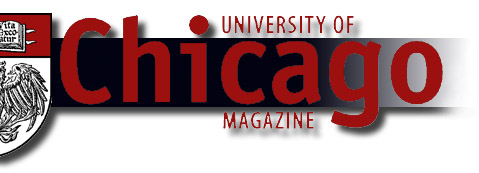 |

Cosmopolitan
tinkerer Shadi Bartsch gets her hands dirty reconstructing both
motorcycles and masterpieces.
As an undergraduate
at Princeton, Shadi Bartsch planned to be a medievalist and “plastered”
her dorm room walls with quotations from Dante’s Inferno,
refusing entry to all who did not recognize the words. But it was
Dante’s guide through the inferno, the great Roman poet Virgil,
who ultimately captured Bartsch’s imagination and led her to
the classics.
With a Ph.D.
in classics from Berkeley, Bartsch, at 32, is one of Chicago’s
youngest full professors. In July, she joined the classical languages
and literatures faculty and the Committee on the History of Culture.
She has written three books and has two others under way, in addition
to numerous review articles. She’s also co-editing the Oxford
Encyclopedia of Rhetoric, a comprehensive reference volume spanning
a variety of cultures and disciplines, and editing The Cambridge
Companion to Classical Rhetoric, aimed at making the classics
accessible to students and a general audience.
It’s
not surprising that a field requiring knowledge of Latin and Greek
and demanding a near obsession with the nuances of ancient rhetorical
devices would appeal to a cosmopolitan tinkerer like the London-born
Bartsch. Most days, she tools with words. Surrounded by books on
ancient Greece and Rome, she takes notes on index cards and later,
John McPhee–like, orders them by the thousands into the bare
bones of a narrative. At other times, she’s immersed in projects
of a more physical kind. She’s gone bungee jumping in California
and skydiving in Illinois, begun retiling her bathroom floor in
a “zany” pattern, and used to ride a navy-blue Honda Nighthawk
650 until she decided, just for fun, to take it apart and put it
back together again, ending up with a short-circuited electrical
system and a seat six inches too high.
Now working
on her fourth and fifth books, Bartsch has had more success with
the mechanics of masterpieces.
“What’s
nice about the manual projects is the illusion of mastering,”
she says. “With texts, it’s different. There’s not
a sense of mastery but of seeing what kind of meaningful narrative
can be formed out of another narrative. Literary criticism is more
about creation than about discovery.”
In one of
her books in progress, The Mirror of Philosophy: Specularity,
Sexuality, and Self-Knowledge in the Roman Empire, Bartsch plans
to create a new interpretation of ancient philosophy, one that emphasizes
the intersection of sight, sex, and self-reflection. The ancient
philosophers, she argues, connected these concepts in much more
deliberate ways than most scholars have recognized. “What we
often don’t appreciate about ancient concepts of vision is
that the act of seeing was understood in tactile terms,” she
explains. “The ancients thought that when you were seeing,
your eyes were either emitting or receiving waves of tangible particles.”
For Bartsch,
what is strange about this interactive understanding of sight is
that vision was understood in correspondingly sexual terms: The
exchange of a gaze with a lover was even treated in some texts as
tantamount to a sexual act. And believing that rays from your eyes
were being reflected back on you, she continues, fostered the notion
that when you looked at a love object, you were really seeing yourself.
“This metaphor of vision and of mirroring as a sexual act,”
she concludes, “is arguably at the root of ancient philosophy.”
Bartsch, who
has lived in Iran, Switzerland, the Fiji Islands, and Indonesia,
is used to taking fresh approaches to some of the classics’
seemingly tired topics. Her first book, Decoding the Ancient
Novel: The Reader and the Role of Description in Heliodorus and
Achilles Tatius (Princeton, 1989), grew out of her undergraduate
thesis and illuminates the narrative purpose of detailed descriptive
passages once considered irrelevant to the main storylines of these
two ancient romance novels.
Her Actors
in the Audience: Theatricality and Doublespeak from Nero to Hadrian
(Harvard, 1994) shows how language can be distorted under tyranny
by taking a closer look at how Roman audiences in the first century
A.D. listened for double meanings in the works of dramatists and
poets. In the book’s epilogue, she takes digs at imitation
cheese, Hallmark greeting cards, and the Reagan administration to
make her point that simulation, insincerity, and staginess still
thrive.
Most recently,
in Ideology in Cold Blood: A Reading of Lucan’s Civil War
(Harvard, 1998), Bartsch wrestles with Lucan’s epic poem,
which describes the Roman republic’s civil war that ended in
the tragic defeat of Pompey and the rise of Nero. Scholars have
been unable to agree on whether Lucan ultimately praises political
ideology or proclaims it as pointless. Bartsch believes that Lucan
went from extreme political cynicism to the adoption of a distinct
political choice, Pompey, drawing parallels between Lucan’s
engaged approach and that of Holocaust historian Hannah Arendt.
Bartsch is
already thinking about yet another book, tentatively titled The
Cult of the Trope: Hermeneutics and the Classics in the Middle Ages.
Looking in particular at the medieval use of figure, Bartsch plans
to illuminate how medieval scholars departed from the literal meaning
of classical texts and then theorized about their own deliberate
misreading—“trope” means literally a turning, or
deviation. By explaining the biases and conceptions that informed
their interpretations, she hopes to show how modern scholarly interpretation,
too, is mediated by a series of practices that could be self-conscious.
The issue
echoes her belief that literary critics, whether medieval or modern,
are themselves creators of ideas, not merely dispassionate observers.
The challenge for critics, she says, becomes acknowledging how their
own perspectives affect their interpretations—without undermining
their credibility.
“In the
humanities, so much of what we do is about creating or selecting
patterns and meanings out of texts and fashioning them into a coherent
narrative about those texts,” she says. “So little of
what we do is about discovering or unveiling or telling the truth
about a text, and once we make a claim about our desires—the
context we’re writing in—the question arises that if we
are creating, not discussing, how can we justify that creation?
The question can be paralyzing because it’s hard to find definitive
answers. There has to be a happy medium between honest attention
to the text and saying something that will matter.”—C.S.
|



